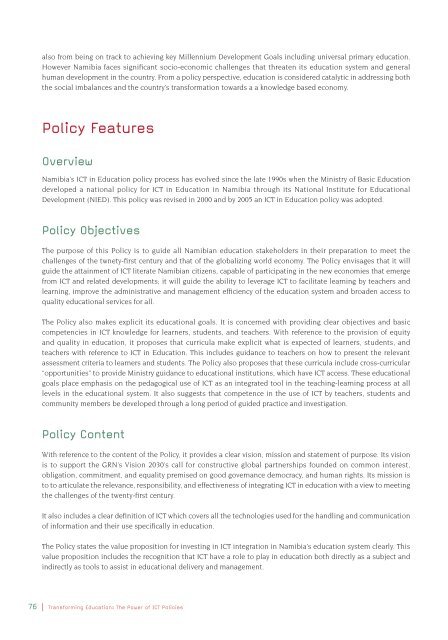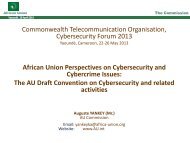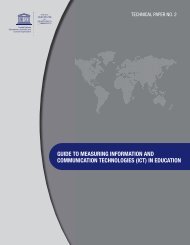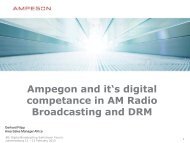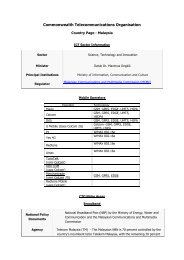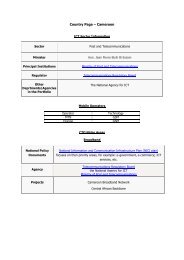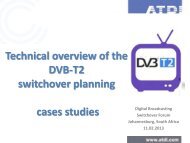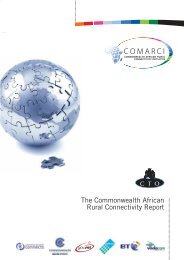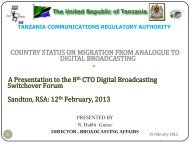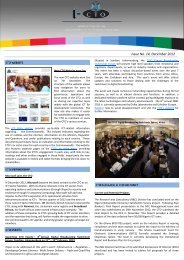Transforming education: the power of ICT policies - Commonwealth ...
Transforming education: the power of ICT policies - Commonwealth ...
Transforming education: the power of ICT policies - Commonwealth ...
Create successful ePaper yourself
Turn your PDF publications into a flip-book with our unique Google optimized e-Paper software.
also from being on track to achieving key Millennium Development Goals including universal primary <strong>education</strong>.<br />
However Namibia faces signifi cant socio-economic challenges that threaten its <strong>education</strong> system and general<br />
human development in <strong>the</strong> country. From a policy perspective, <strong>education</strong> is considered catalytic in addressing both<br />
<strong>the</strong> social imbalances and <strong>the</strong> country’s transformation towards a a knowledge based economy.<br />
Policy Features<br />
Overview<br />
Namibia’s <strong>ICT</strong> in Education policy process has evolved since <strong>the</strong> late 1990s when <strong>the</strong> Ministry <strong>of</strong> Basic Education<br />
developed a national policy for <strong>ICT</strong> in Education in Namibia through its National Institute for Educational<br />
Development (NIED). This policy was revised in 2000 and by 2005 an <strong>ICT</strong> in Education policy was adopted.<br />
Policy Objectives<br />
The purpose <strong>of</strong> this Policy is to guide all Namibian <strong>education</strong> stakeholders in <strong>the</strong>ir preparation to meet <strong>the</strong><br />
challenges <strong>of</strong> <strong>the</strong> twnety-fi rst century and that <strong>of</strong> <strong>the</strong> globalizing world economy. The Policy envisages that it will<br />
guide <strong>the</strong> attainment <strong>of</strong> <strong>ICT</strong> literate Namibian citizens, capable <strong>of</strong> participating in <strong>the</strong> new economies that emerge<br />
from <strong>ICT</strong> and related developments; it will guide <strong>the</strong> ability to leverage <strong>ICT</strong> to facilitate learning by teachers and<br />
learning, improve <strong>the</strong> administrative and management effi ciency <strong>of</strong> <strong>the</strong> <strong>education</strong> system and broaden access to<br />
quality <strong>education</strong>al services for all.<br />
The Policy also makes explicit its <strong>education</strong>al goals. It is concerned with providing clear objectives and basic<br />
competencies in <strong>ICT</strong> knowledge for learners, students, and teachers. With reference to <strong>the</strong> provision <strong>of</strong> equity<br />
and quality in <strong>education</strong>, it proposes that curricula make explicit what is expected <strong>of</strong> learners, students, and<br />
teachers with reference to <strong>ICT</strong> in Education. This includes guidance to teachers on how to present <strong>the</strong> relevant<br />
assessment criteria to learners and students. The Policy also proposes that <strong>the</strong>se curricula include cross-curricular<br />
“opportunities” to provide Ministry guidance to <strong>education</strong>al institutions, which have <strong>ICT</strong> access. These <strong>education</strong>al<br />
goals place emphasis on <strong>the</strong> pedagogical use <strong>of</strong> <strong>ICT</strong> as an integrated tool in <strong>the</strong> teaching-learning process at all<br />
levels in <strong>the</strong> <strong>education</strong>al system. It also suggests that competence in <strong>the</strong> use <strong>of</strong> <strong>ICT</strong> by teachers, students and<br />
community members be developed through a long period <strong>of</strong> guided practice and investigation.<br />
Policy Content<br />
With reference to <strong>the</strong> content <strong>of</strong> <strong>the</strong> Policy, it provides a clear vision, mission and statement <strong>of</strong> purpose. Its vision<br />
is to support <strong>the</strong> GRN’s Vision 2030’s call for constructive global partnerships founded on common interest,<br />
obligation, commitment, and equality premised on good governance democracy, and human rights. Its mission is<br />
to to articulate <strong>the</strong> relevance, responsibility, and effectiveness <strong>of</strong> integrating <strong>ICT</strong> in <strong>education</strong> with a view to meeting<br />
<strong>the</strong> challenges <strong>of</strong> <strong>the</strong> twenty-fi rst century.<br />
It also includes a clear defi nition <strong>of</strong> <strong>ICT</strong> which covers all <strong>the</strong> technologies used for <strong>the</strong> handling and communication<br />
<strong>of</strong> information and <strong>the</strong>ir use specifi cally in <strong>education</strong>.<br />
The Policy states <strong>the</strong> value proposition for investing in <strong>ICT</strong> integration in Namibia’s <strong>education</strong> system clearly. This<br />
value proposition includes <strong>the</strong> recognition that <strong>ICT</strong> have a role to play in <strong>education</strong> both directly as a subject and<br />
indirectly as tools to assist in <strong>education</strong>al delivery and management.<br />
76 | <strong>Transforming</strong> Education: The Power <strong>of</strong> <strong>ICT</strong> Policies


